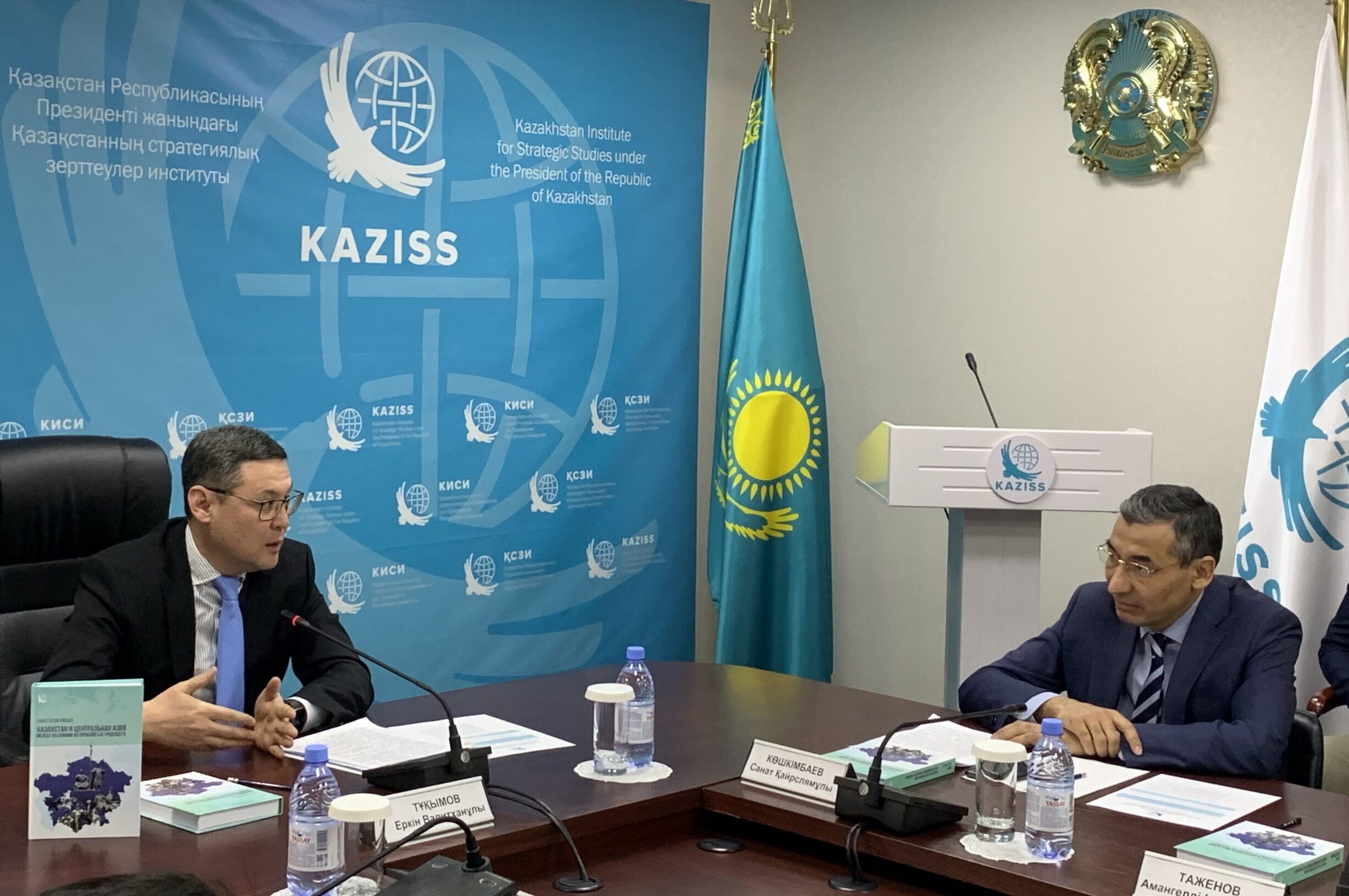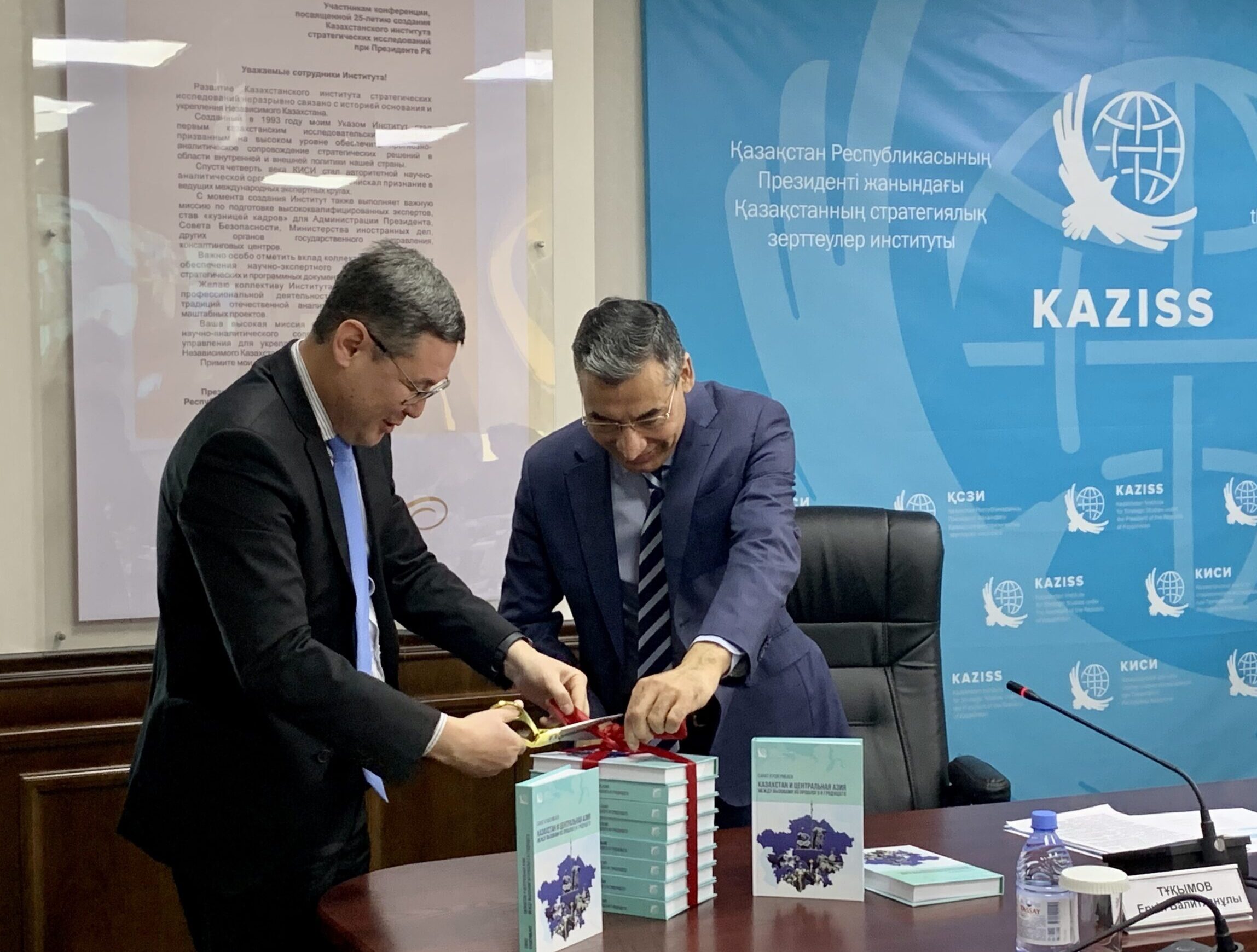ASTANA – A new book by Sanat Kushkumbayev, the deputy director at the Kazakhstan Institute for Strategic Studies (KazISS), offering a political perspective on the country’s domestic and foreign policy, regional cooperation, security in Central Asia, and national identity, was presented at KazISS on Feb. 3 in Astana.

KazISS director Yerkin Tukumov and deputy director Sanat Kushkumbayev at the presentation of the later’s newest book. Photo credit: astanatimes.com.
Titled “Kazakhstan and Central Asia Between Challenges from the Past and the Future,” the book is a collection of articles, speeches, and interviews over a quarter of a century that reflect the region’s evolution, analyze the main challenges and risks, and trace trends and development scenarios.
The author, Sanat Kushkumbayev, is a doctor of political science and a renowned expert in international relations who has significantly influenced the development of national, international, and regional security narratives.
Kushkumbayev addresses this period in a chronologically ordered series of articles that reflect the key issues during various periods of Kazakhstan’s independence, reflecting on relevant topics and those whose relevance has since subsided.
“Everything new is well forgotten old,” said Kushkumbayev. “Many questions remain relevant. Today cooperation is still on the agenda for Kazakhstan and our neighbors. The demand is being formed in society and among states for regional cooperation, and we are spiraling through the same issues discussed 30 years ago.”
Kushkumbayev offers a retrospective viewpoint in his book, frequently stating some issues have remained on the agenda. However, instead of looking at it as a history lesson, it can be used to reassess the experiences, including the grim ones.
“Despite the fact that we have passed the 30-year mark of independence, many problems related to water, ecology, border issues, transport and transit remain unsolved. Moreover, new challenges have been added to them,” he said.

According to Tukumov, given the growing importance of regional interaction, the book’s relevance is as high as ever. Photo credit: astanatimes.com.
The book’s first part focuses on how regional cooperation issues have evolved. At the dawn of independence, stability and security questions were at the forefront of Kazakhstan’s foreign policy.
“Midway through the 2000s, the interest in regional cooperation waned, but parallel to that, non-regional cooperation gained popularity and impact. Examples of this include the emergence of the Eurasian Economic Union (EAEU) and the Shanghai Cooperation Organisation (SCO),” said Kushkumbayev.
The analysis of shifting trends can serve as a good resource for scientists and researchers, experts, diplomats, and students.
Other strands have emerged, such as the effort to build a national identity, which is discussed in the book’s second part.
“This is due to the changing role of Islam in our society. Demographics have changed: most of the population of Central Asia was born in the post-Soviet period. The changes have been very serious. The euphoric revival of religiosity in the 1990s produced results, including challenges in the late 2000s,” said Kushkumbayev.
During the presentation, KazISS Director Yerkin Tukumov said that the book is highly relevant now amid increasing international instability and the growing importance of regional interaction.
“Central Asia is once again the focus of big international politics, now as a bridge between East Asia, South Asia, and the West. As KazISS experts, we attach great importance to regional country studies. Central Asia is an absolute priority for our institute, and we are successfully promoting a cooperative agenda at the expert level,” he said.
The book’s regional focus envisions a deeper understanding of the internal processes of Central Asia from both historical and political science perspectives that can be used as a foundation for research on future trends.
Some trends were explored at the Central Asia 2030 conference on Jan. 20 at KazISS, which has become a traditional venue for meetings with experts from Central Asia.
According to Tukumov, an expert survey among the conference participants on how they see the region in 2030 mainly showed optimistic predictions.
“On the whole, positive trends prevailed. For example, experts believe that, in terms of transport, the transformation of Central Asia into a transit hub is more likely with 56.4 percent supporting such a view compared to an increased competition between countries [33.3 percent],” said Tukumov.
Given the central role of economic interaction among the region’s countries, cargo volumes will naturally rise, increasing the chances of the region becoming a transport hub, according to him.
“That is why I think it is no coincidence that the majority of respondents, 69.2 percent to be exact, noted that it is infrastructure projects that are the main point of growth in Central Asia,” said Tukumov.
One of the most likely trends by 2030 is an increased Central Asia-wide cooperation to ensure regional security, a view shared by 64.1 percent of the respondents.

